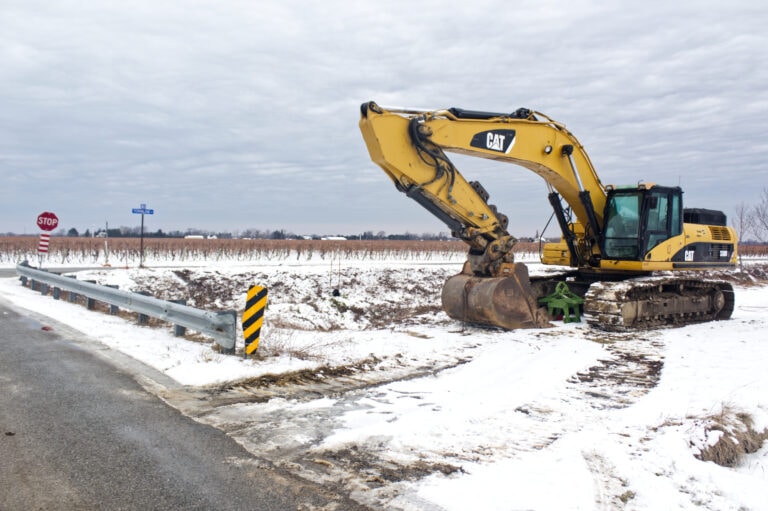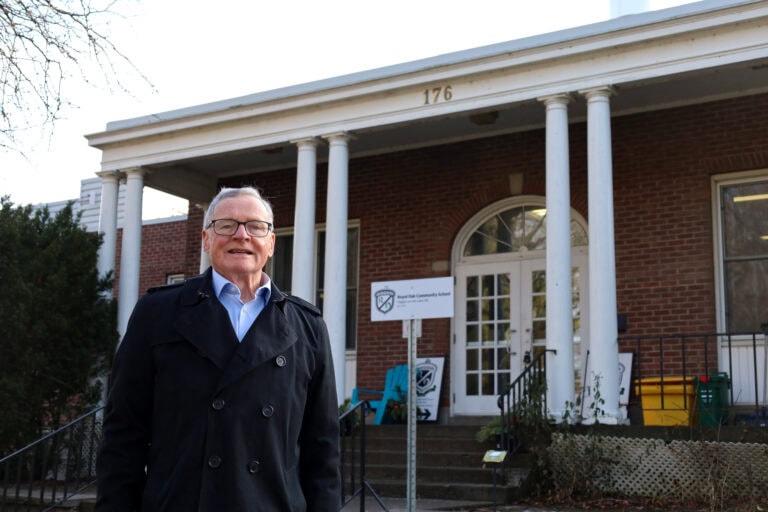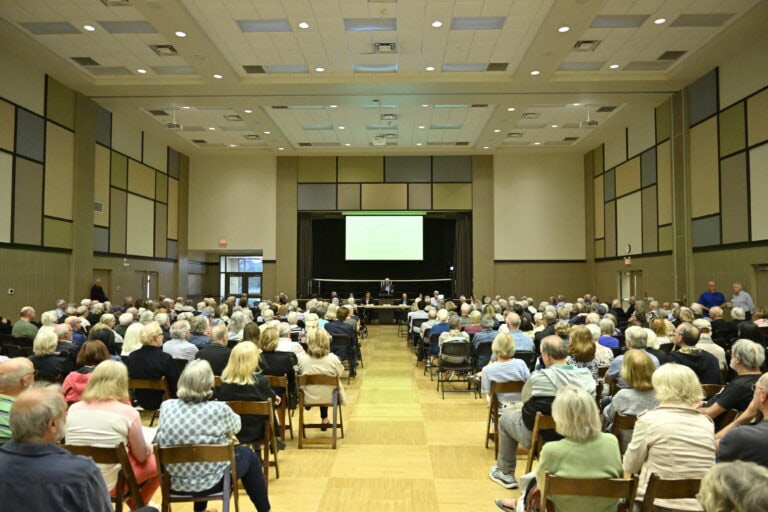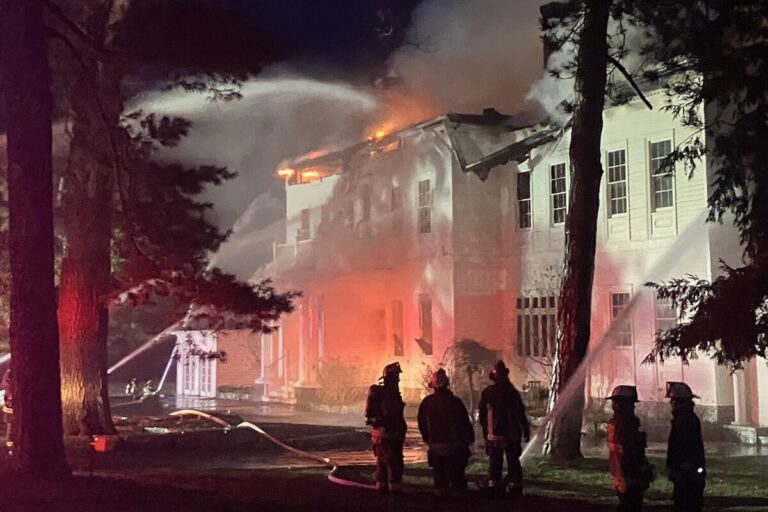A judge has refused to throw out a defamation suit filed by developer Benny Marotta against a Niagara-on-the-Lake senior who made critical comments on social media about the prominent builder.
In a ruling last Thursday, Justice Edward Morgan of the Ontario Superior Court in Toronto dismissed an application by Stewart Hall, who had argued his comments on the NOTL 4U Facebook group should be considered protected speech under Ontario’s anti-SLAPP legislation.
SLAPP laws, or “strategic litigation against public participation,” are intended to prevent powerful people or organizations from using the courts to silence public criticism.
The case stems from a June 2024 post in the NOTL 4U group, where Hall accused Marotta and his companies of engaging in corrupt business practices, offering bribes to politicians and employing aggressive tactics against opponents.
Hall’s post followed a controversial 5-4 town council vote that approved Marotta’s proposal to build a hotel on the former Parliament Oak school site, which he purchased in 2022.
Morgan determined Hall’s statements went beyond fair comment and could reasonably be seen as defamatory. The decision means Marotta’s suit against Hall can continue.
In his decision, he described the post as “intemperate” and an “ad hominem attack” that implied widespread bribery and corruption without any factual basis.
Hall told The Lake Report he plans to appeal Morgan’s ruling.
“It was shocking and disappointing to receive the judge’s decision on my motion to dismiss the $2 million libel suit brought against me by Solmar and Benny Marotta,” he said in a statement.
“I feel that it was unfair and unreasonable based on the evidence presented to court.”
Hall said he removed the post a week after it was published.
“To be sued for a Facebook post that commented on an issue of public interest, was up for seven days, was seen by a limited number of people and removed at the request of Solmar’s lawyer is disturbing,” he said.
“I view this as an attempt by a large corporation and wealthy individual to silence an ordinary citizen commenting on an issue of public importance.”
In a statement supplied via his lawyer, Marotta said he was “very pleased with the judge’s decision and in particular his findings and look forward to total vindication at trial.”
“I am hopeful that all development applications in the town can be dealt with on merit without council and staff being subjected to false, accusatory and inflammatory influences, and as always I look forward to working with our community.”
The Facebook post and its consequences
Hall’s post specifically questioned whether councillors who voted in favour of Marotta’s hotel project had received undisclosed gifts or payments.
He encouraged readers to search online for past legal disputes involving Marotta’s company, Solmar, and accused the developer of bullying political opponents through lawsuits.
Marotta’s lawyers argued the statements were not only false but damaging to their client’s reputation and business interests.
They pointed to investigations by police and the town’s integrity commissioner, both of which found no wrongdoing related to a $10,000 cash envelope Marotta handed to Coun. Gary Burroughs in March 2023. Burroughs returned the envelope and no charges were laid.
Hall admitted in court in February that he was aware no legal action resulted from the incident, but he continued to suggest corruption in his Facebook post.
Judge’s analysis: Fair comment or defamation?
To succeed in an anti-SLAPP motion, a defendant must demonstrate their speech was a matter of public interest and had substantial merit, the judge noted. The court must also weigh the harm caused by the speech against the public interest in allowing it.
Morgan found that while development projects and municipal decisions are matters of public interest, Hall’s statements crossed the line into defamation.
He noted the Facebook group had 3,100 members, including town councillors, and that Hall’s words could have serious repercussions for both Marotta and local officials.
“The thrust of the post is that the plaintiff and his companies have a longstanding practice of bribing public officials and of suing all who oppose him,” Morgan wrote.
“The two posts also convey that those public officials who support the plaintiff’s real estate projects … have either been intimidated or received bribes and are equally corrupt.”
Morgan said the message “is designed to do more than to galvanize opposition to the Parliament Oak development project; it is designed to disqualify any and all development by (Marotta).”
Hall’s claim that he was merely posing questions or encouraging research was dismissed by the judge, who noted that rhetorical questions such as “How many received cash or gifts in kind from Marotta that were not reported?” were clearly intended as accusations.
“The statement is a sardonic way of suggesting that of course there were other cash gifts,” Morgan wrote. “For the defendant to say that he was just raising questions is, frankly, to understate the intelligence of the reader.”
Morgan also noted that Hall had not actually read the articles he referenced in his post and conceded under cross-examination that he did not believe some of his own allegations were true.
“I make no comment on the content of this Facebook post — i.e. whether it contains truth, whether it is ‘just desserts’ for the plaintiff, whether it is an effective form of community advocacy, etc. But I am not editorializing when I say that the tone and content of the message is, by any measure, intemperate. The fact that it prompted a lawsuit is perhaps the least surprising thing about it,” Morgan wrote.
Public interest vs. harm
In weighing the potential harm of the lawsuit against the importance of public debate, Morgan determined that Hall’s accusations carried serious consequences for Marotta’s business and reputation.
He noted the developer’s projects, including the Parliament Oak hotel, require ongoing municipal approvals and that public perception could impact future votes.
“Being known as a corrupt developer whose supporters take bribes is bound to be a type of harm that will cause serious detriment to the plaintiff and his business,” Morgan wrote.
He continued that “NOTL is a town of 19,000 residents, and in the small-town environment described by the (Hall) one can reasonably assume that a significant percentage of the community will have seen or been referred to (Hall’s) post.”
While acknowledging the importance of public discussion on local development, Morgan ruled that Hall’s approach — levelling serious, unsubstantiated accusations — did not contribute meaningfully to the debate.
“There is, of course, legitimate public interest in expression that addresses real estate development and local development applications,” Morgan wrote.
“But that interest does not weigh heavily on the ledger where the expression, as here, takes the form of serious, unsubstantiated accusations against a developer and city councillors rather than an actual critique of a development policy or plan.”
Morgan also rejected arguments that Facebook should be considered a more lenient platform for public discourse, writing that “social media is not a defamation-free zone.”
He acknowledged Marotta’s lawyers conceded that he “is or has been engaged in some personal litigation against the mayor of Caledon, as prominently mentioned in the (Hall’s) original post,” but since that legal action is unrelated to any development proposal in Caledon or elsewhere, “(Hall’s) reference to it in the context of his Facebook message about development approvals is thus an entirely gratuitous reference injected as an element of character assassination rather than as a bona fide argument about (Marotta’s) real estate developments.”
“The message is designed to do more than to galvanize opposition to the Parliament Oak development project; it is designed to disqualify any and all development by (Marotta). Not only does it call (Marotta) a criminal operator, but it ‘casts aspersions,’ as (Hall) has conceded, on any officials who might agree with him.”
Hall argued that his statements were merely questions, however Morgan found that “the impugned Facebook posts were designed to lower the Plaintiff’s reputation in the eyes of the reasonable reader, and they are bound to do so … The message cannot be rationally understood in any other way.”
Morgan said they comments are more than questions, but “piercing barbs, whose form is a question but whose meaning is an accusation.”
He decided Hall has no valid anti-SLAPP defence to the defamation claim and dismissed the motion.
Next steps in the case
With Hall’s anti-SLAPP motion dismissed, the defamation lawsuit can proceed, barring a settlement. If found liable, Hall could face financial damages for harming Marotta’s reputation.
Marotta has filed a submission for the legal costs pertaining to the anti-SLAPP motion. Marotta’s lawyer, William McDowell, a partner at Lenczner Slaght, would not comment on the costs being sought as it is still before the judge.











